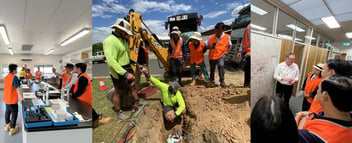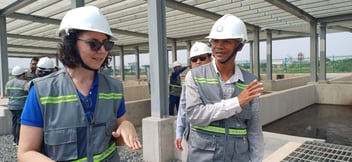Lessons from Cambodia on enhancing gender equality in the water sector

Women and men have different experiences, knowledge and needs in water, sanitation and hygiene (WASH), underlining the importance of gender equality and inclusion in the water sector.
That’s the message delivered by Melita Grant during a session devoted to women in water at the second Cambodia–Australia Water Policy Forum, a two-day gathering that drew water policy representatives from the Cambodian and Australian water sectors.
Grant, Research Director at the University of Technology Sydney’s Institute for Sustainable Futures, presented research that explores roles that women play in rural WASH enterprises in Cambodia, and delivered recommendations for developing greater gender equality in the water sector.
“We need to look into the differences between water users and knowledge holders, and draw on and cater for these differences. There's a huge breadth of knowledge in our communities, so let's tap into that diversity” Grant said.
“We've found through research that the sustainability of water management programs is enhanced when they're designed to be inclusive. This means that water management projects have a higher likelihood of being sustained and not falling over in a few years.”
This is important because women are deeply involved throughout the water sector, Grant found, though they are often excluded from a range of forums and processes.
“Our research has found that women play many roles in the WASH system; they’re piped water entrepreneurs, latrine business owners, masons, sanitation, marketing, sales agents, WASH product retailers — they're also leading at the commune level, district level, provincial level, national level in ministries related to water.”
The research pointed to areas with potential to boost gender equality included building networks, involving the men in women’s lives and their families, and creating leadership and training opportunities.
“That means tailoring training to their needs,” Grant pointed out. “And that might be accommodating family responsibilities, issues around transportation to training, venues and concerns around leaving the home for long periods of time and social stigma around travel.”
She also explained the importance of accessible finance, and monitoring and evaluation that encompasses both quantitative and qualitative data.
Genuine change
There is meaningful opportunity in the Australian and Cambodian water sectors to enhance gender equality, Grant believes.
“There is a lot of interest in supporting gender equality and inclusion as a result of a number of factors, such as the [United Nations] Sustainable Development Goals, which call on all actors to consider the relationship between the goals, and in this case, Goal 5 — gender equality — and how it needs to be connected to all the other parts of creating sustainable futures,” she said.
“Also, [there is] the influence of donors such as DFAT and other donors that are resourcing and supporting genuine activity in the gender equality, disability and social inclusion space.
“And when I say genuine activity, I mean beyond monitoring evaluation and data disaggregation, and more in the direction of partnerships — with rights holder organisations — and capacity building, and research and understanding of what the real gaps and needs are.”
Cambodia and Australia’s water sectors have a lot to learn from one another, Grant said.
“We have a lot to share with each other about how to make our water sectors more inclusive — and inclusive means the experiences, disciplines, ages and abilities, and ensuring that all those voices are part of making decisions around water management and a part of the institutions that manage water,” she said.
“[And] at the policy level, the way in which our countries have decided to manage and regulate water, particularly related to water sharing and prioritisation of water uses. Australia has done a lot of work with communities in managing competing interests and uses, and coming up with ways to share water.”
International collaboration
Other sessions at the Cambodia–Australia Water Forum explored the Water Development Fund, water governance, and water resilience and climate change.
“The Cambodia– Australia Water Policy Forum provides a great opportunity for our sectors and key regional experts to come together and share knowledge, experience and lessons learnt from our water journeys to help shape the future of water governance and management in the context of a changing climate, growing populations and increasing competition for water,” said AWA CEO Corinne Cheeseman.
“AWA and CWA have a long history of collaboration and this forum is a continuation of our commitment to driving a sustainable water future for our sectors, our members and the people we serve.”
A photo gallery from the event can be found here.


